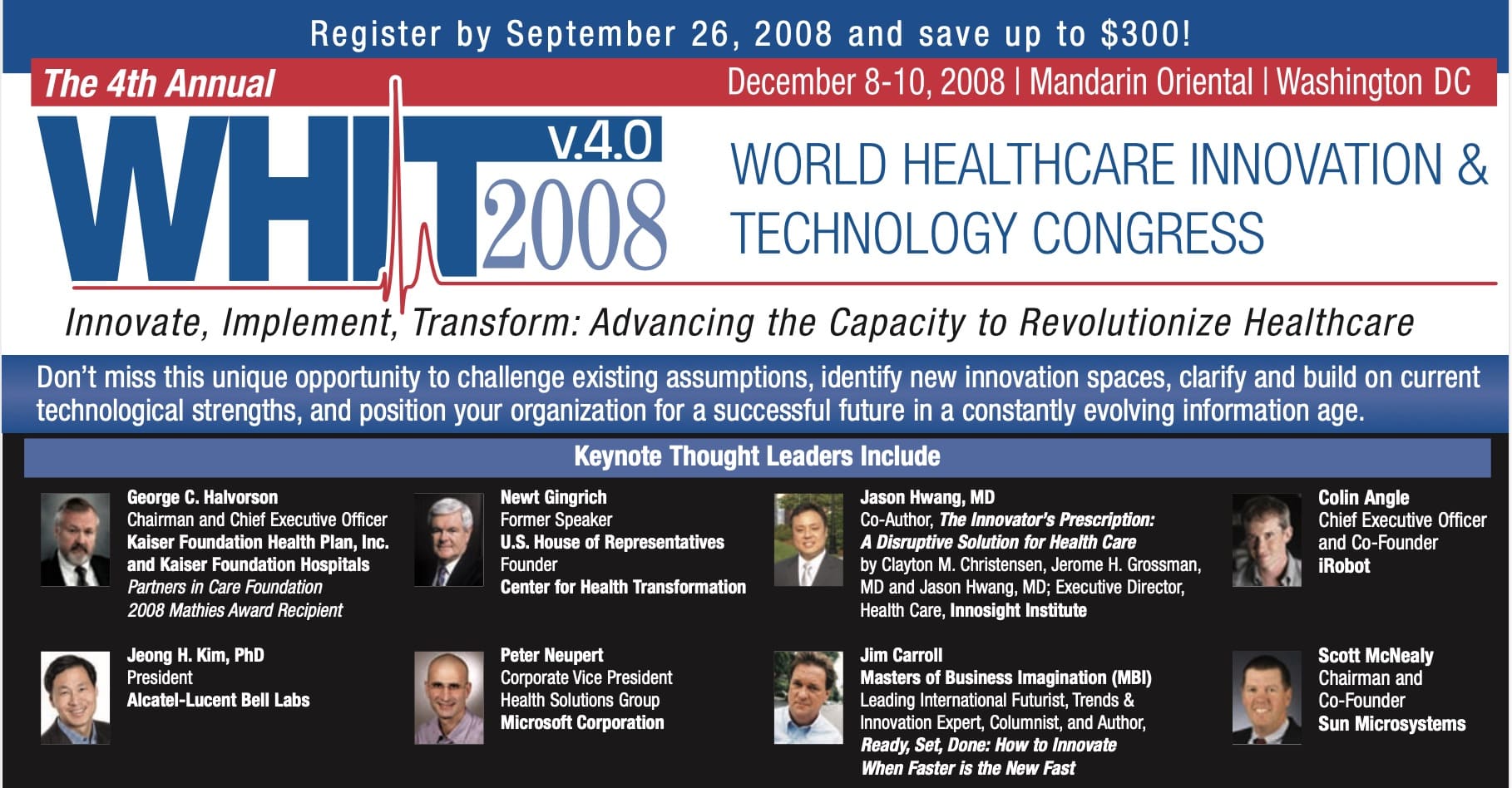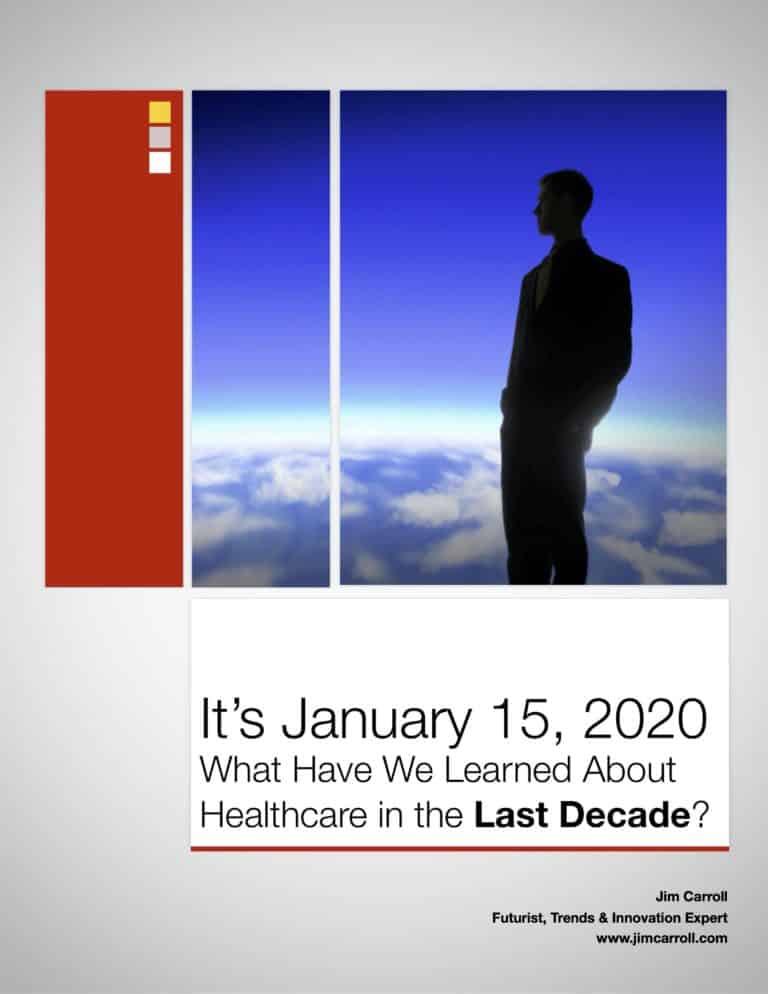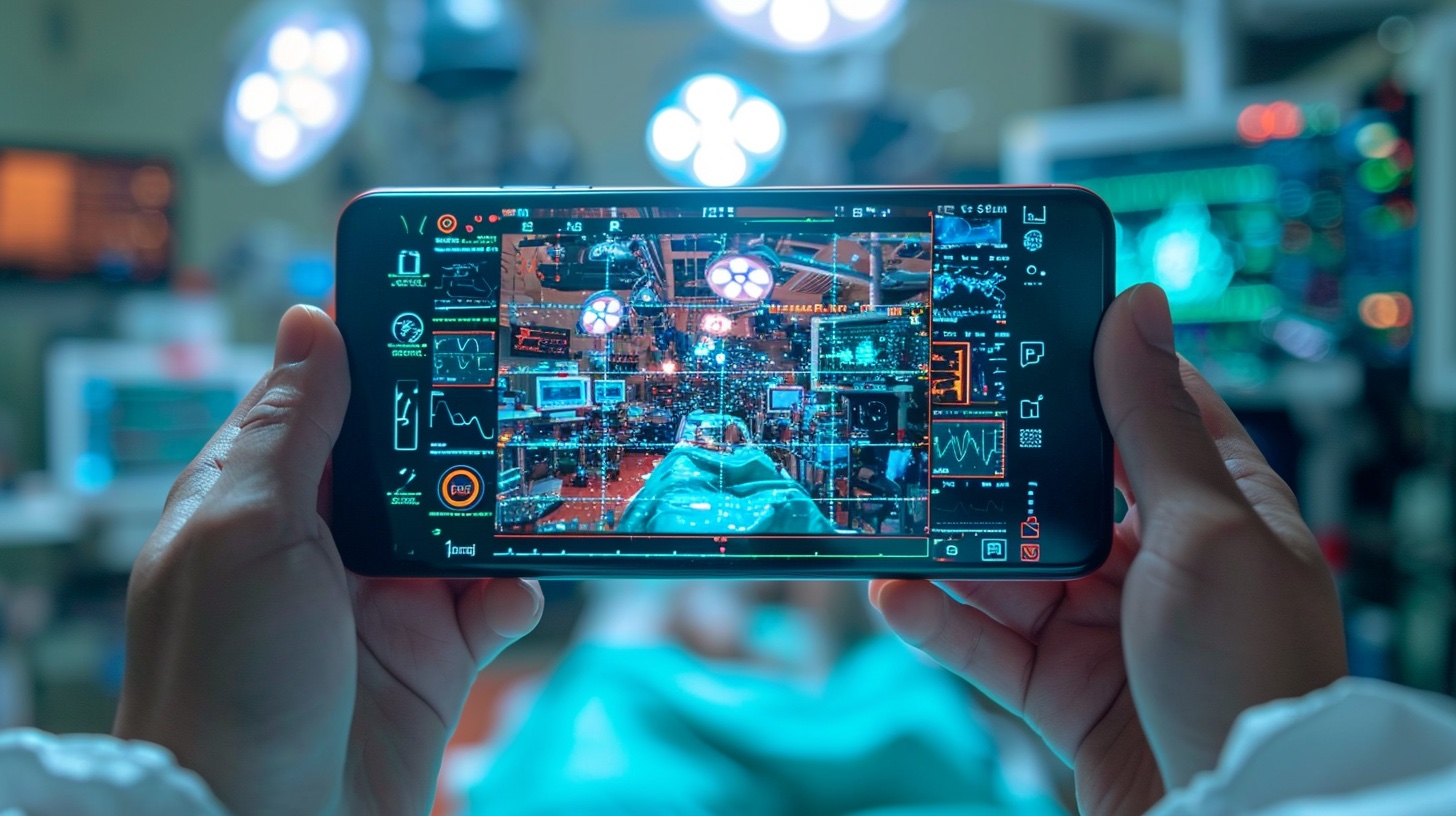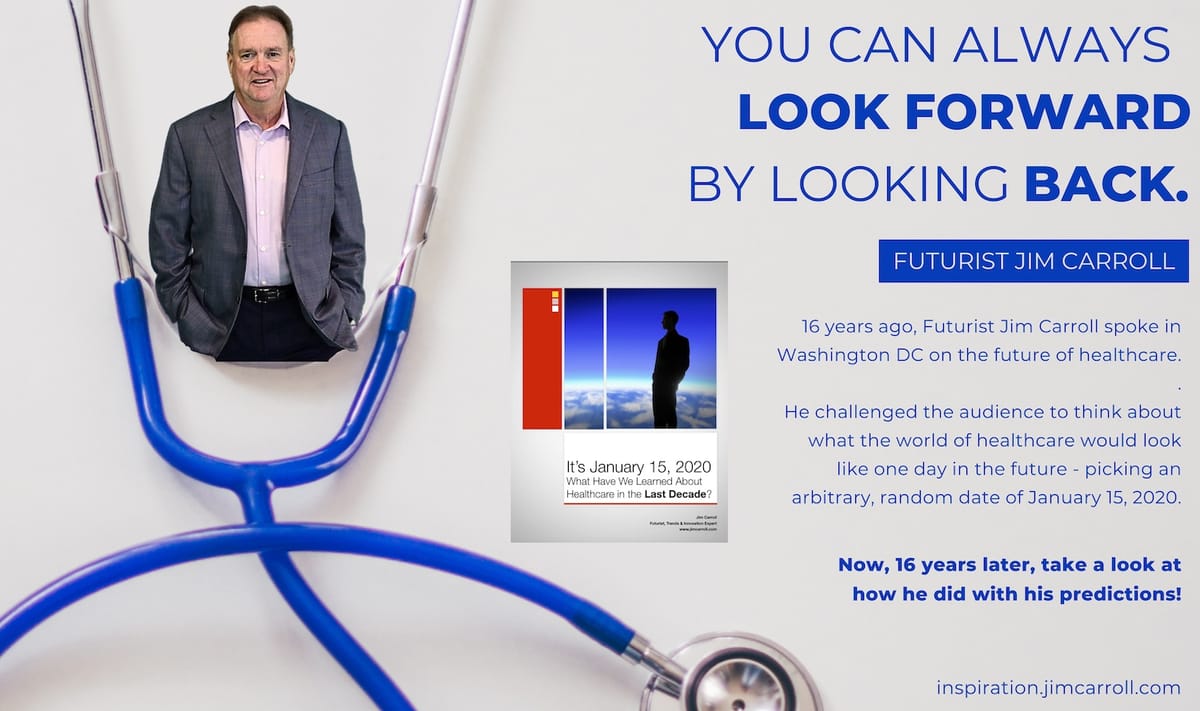"You can always look forward by looking back!" - Futurist Jim Carroll
"16 years ago, Futurist Jim Carroll spoke in Washington DC on the future of healthcare.
He challenged the audience to think about what the world of healthcare would look like one day in the future - picking an arbitrary, random date of January 15, 2020.
Now, 16 years later, take a look at how he did with his predictions!
Welcome to all my new followers on my new Ghost platform at https://daily.jimcarroll.com. Today's post is longer than normal! I hope you stick around!
One of the things I always emphasize to an audience is that one of the best ways to try to predict the future is by projecting yourself into it and looking back in time.
I did that back in December 2008 - I was in Washington D.C. as the closing keynote speaker for the 4th Annual World Healthcare Innovation & Technology Congress. To give my talk some structure, I took a look at what the industry might look like 12 years out - picking a random date in the future - January 15, 2020 - and pretended to look back from that date to the date of the conference to emphasize how much change had occurred.

I managed to dig out the brochure for the event - in it, I'm listed as Jim Carroll - Masters of Business Imagination, which is an idea I was pushing hard at the time.
It was a fascinating conference at the cutting edge of the promise of the transformation of healthcare at the time. There were some 'heavy hitters' on the agenda: Newt Gingrich (I guess as head government policy-wonk); Scott McNealy (Chairman, Sun Microsystems), and a few CEOs and authors. And me - the futurist who takes the conference into the reality of what comes next.
(I think this particular conference disbanded a few years later.)
While preparing for my keynote in mid-2008, I hit upon a theme that I will often use in my keynotes - what would a certain industry look like on a certain day in the future? And so without really thinking about it, and since 2020 seemed to have a cool resonance to it - and for who knows whatever reason - I chose January 15, 2020. I wrote an article for their (since vanished) blog, and created a fine-looking PDF based on that material, which you can grab here - and developed my keynote around the theme.

My high hopes for the future - and the storyline I carried to the stage - were found in the opening section of the PDF:
"Rapid technological development and relentless innovation are the two key trends that will provide for a forthcoming massive transformation of our health care system in the future.
The real challenge is: with so much knowledge and insight to be shared, is it truly possible to understand where we are going with the world of health care?
It's often difficult to do so. That's why, for the last fifteen years, Jim Carroll has been providing his guidance into future trends to a wide swathe of global Fortune 1000 companies, associations, and other groups at many events and conferences. This has included a large number of healthcare groups.
He’s learned that sometimes, it is easier to open up the minds of people to big trends by taking a look *back* rather than by taking a look forward.
So let's say it's the year 2020.
Let’s take a look back over the last decade to see what happened with the world of health care!"
My keynote went into these issues in a lot more depth. I managed to go into the vaults and dig out the (very low-quality format) video of my talk on December 10, 2008, at the Mandarin Hotel in Washington. In my view, it's a fantastic little 4-minute 40-second rant on the future of healthcare!
On January 15, 2020, I revisited these predictions in a blog post and gave myself a grade on their accuracy. Just after that post, the global pandemic enveloped the world, and suddenly, everything changed, rendering much of my grading moot! And today, on the 16th anniversary of the date, I thought I would take a look again, re-examining what changed from 2020 to 2024.
#1 The System Went Upside Down
What I said: "By 2020, we had successfully transitioned the health care system from one which "fixed people after they were sick" to one of preventative, diagnostic medicine. Treating them for the conditions we know they were likely to develop."
My grade in 2020? C
Observation: This hasn't really happened. The system is still very much wrong side up. Genomic medicine has made great strides, but we haven't really turned the system upside down. We haven't really achieved real preventative care. There is still so much massive potential here, but it's going to take way longer than I thought because of system inertia.
My grade in 2024? B
Observation: There's been a LOT of momentum on this front, from the acceleration of genomic science and mRNA, to the entire preventative mindset that exists in healthcare - but there is still a long way to go.
#2 Customer Service Became the #2 Mission
What I said: "The number one priority today, of course, remains ensuring that patients receive top-notch, first-rate health care as soon as they need it. But the revolution in health care service delivery really came when retail, consumer and branding experts took over a good part of the health care delivery infrastructure."
My grade? B.
Observation: In the US there's a real focus on outcomes, results, efficiencies, cost management - it's run more like a business than ever before. On the other hand, is customer service with a 'smile' as I note in the document happening? Not really.
My grade in 2024? B+
Observation: We saw a lot of ''pop-up' medicine with the pandemic, particularly around vaccine delivery. I think the system learned a lot as to how to re-engineer itself, leading to lasting changes. But there is still a long way to go.
#3 The Number 1 Revenue Source for Silicon Valley is Now Health-Care Related
What I said: "People began talking about Health 2.0 — and a world in which technology would play a massive role in the revitalization of the system. Looking back, the results of their innovation efforts were astounding. They launched new products, new business models, scientific discovery tools, bio-informatics platforms that provided the foundation for diagnostic medicine, and many other incredible items. When Silicon Valley got involved in a big way, everything changed."
My grade in 2020? C
Observation: Tech companies are still, IMHO, just dabbling around the edges. There's no real significant venture capital; there is no Apple or Netflix or Uber; there is no massive disruptor. Amazon and Google and various initiatives are making a lot of noise, but it just seems to be a lot of noise. And indeed, it might take longer because the system is just so darned complex.
My grade in 2024? A-
Observation: While it's not a topic revenue source, healthcare and tech now go together hand in hand!
#4 Bio-Connectivity Reinvented the Concept of Hospitals
What I said: "Today, of course, a good proportion of both critical and non-critical care patients receive health care at home. We’ve transitioned to a virtual community oriented caregiving strategy which has resulted in cost reductions and a refocus of critical health care spending."
My grade in 2020? B+
Observation: I'm seeing a lot of cool initiatives around virtualized healthcare - Mercy Virtual of the Mercy Health system comes to mind. And the field of online consultations has exploded, and has evolved even faster than I thought. Kudos to this! Virtualized yet though? No.
My grade in 2024? C
Observation: A+. Simply put, telemedicine and virtual medicine came to reality with the pandemic, and is widely accepted and practiced today.
#5 High Velocity Change The "New Normal"
What I said: "Today's medical professional has their 239th generation iPhone at their side, they're interacting with labs, medical libraries, their social-network-specialists peers and other knowledge-network peers: they continue to drive change forward at a furious pace."
My grade in 2020? A
Observation: Demographics is driving change - the new younger doctor and medical professional is rapidly aligning to new ways of work, online access and more. 3D printing is rapidly coming into such fields as orthopaedic surgery. Old fashioned x-ray films are just that. Technology has swept the industry, and so while there is a long way to go, the system is pretty good at aligning to fast change.
My grade in 2024? A+
Observation: AI and healthcare. Rapid response to the pandemic. Everything changed and the system will never be the same.
#6 The Triumph of Device Intelligence
What I said: "By 2020, most of us found that our "personal area network" included much more than our MP3's, video players and other digital content: it included huge chunks of intelligence from our daily health interactions."
My grade in 2020? A+
Observation: iPhones everywhere. People are more engaged with their own health than ever before as a result of constant bio-connectivity. This prediction was essentially low-hanging fruit.
My grade in 2024? A+
Observation: See #5 above.
#7 Computational Analytics Allowed Us to Rapidly Refocus Resources
What I said: "While today we accept the health care location intelligence professional as an integral part of the hospital team, back in 2008 they were but a rare anomaly. Today, of course, most health care facilities use the insight of such professionals to regularly track, monitor, and devise proactive plans to deal with new emerging challenges. We’ve come to link massive subsets of data to geographic insight, allowing us the ability to better plan, manage and deal with complex circumstances."
My grade in 2020? D.
Observation: I really thought we'd see more technology that would help us to predict and manage health care conditions in real time - big-data analytics stuff. It hasn't really happened in my view - a missed opportunity!
My grade in 2024? A-
Observation: Real time predictive healthcare intelligence became real during the pandemic, and analytics now plays a more significant role in much of what we do.
#8 We Adapted To Faster Science Through High-Velocity Structure
What I said: "We came to realize that it was our ability to rapidly ingest new knowledge that became a key saviour in our re-engineering of the concept of our health care; it was our speed of action that defined our success."
My grade in 2020? A-
Observation: I have a cousin who is an orthopaedic surgeon - and he is using 3D modelling to plan pathways for success. I golf with a dentist who is firmly aligned to the opportunities for the use of lab-grown tissue for implant surgery. I go on stage at medical conferences and see announcements of fascinating developments in the field of human organ replacement with lab grown materials. A lot of anecdotal stuff, but my hard core research that I do for every healthcare and Pharma keynote confirms to me this is moving forward - fast!
My grade in 2024? A
Observation: Fast science is everywhere and the mindset of adoption is real - one need only look at the new devices that surround us.
#9 We Transitioned To A Medical Culture Of “Just-In-Time-Knowledge”
What I said: "Given the constant doubling of medical knowledge in ever shorter time spans we came to know that the system could no longer function based on an antiquated model of one-time knowledge delivery. Medical schools adapted, providing for the "velocity" of knowledge that was required by ever more rapid scientific advance."
My grade? B+.
Observation: #8 wouldn't happen without this, so this is happening at a decent speed.
My grade in 2024? A
Observation: Enter AI.
#10 We Rose to the Challenge
What I said: "We realized that he caught the imagination of an entire generation, who came to know that this decisive, broken and complex industry was now their new Peace Corps. Along came an awakening that they could turn their attention from sharing quick-knowledge hits on now-defunct networks like Facebook and Twitter, and instead, heed a greater call to action. They aimed their minds towards one of the deepest challenges of our time and turned on their innovation engines. And as we know now, that was a truly transformative moment."
My grade in 2020? E to marginal F.
Observation: So, health care reform passed, and then health care wars began. The system is still bogged down in relentless hopeless politics. There is no solution in sight - the 'great gutting' of the system which occurred from late November 2016 to today, and a trillion dollar federal deficit, means that while the staggering scope of the challenges remain, there is little opportunity for big bold fixes. It's not going to be pretty going forward - either for the system, or for the patients!
My grade in 2024? B
Observation: Overall,. the healthcare system proved itself with the global pandemic, and many of the changes that were implemented at speed have stayed in place.
Over the years, the structure and idea of the January 15, 2020 theme became the foundation for my many talks in the healthcare sector: here's a clip from a massive event in New Orleans for the International Foundation on the theme.
Where do we go from here? What have I learned since that talk almost 11 years ago?
At a high level
- the science and technology of healthcare is moving fast - see below!
- some patients and medical professionals are also aligning to fast change - but not all
- the system is way too complex to see some of the transformative change of which I speak come about - it will still happen but in fits and starts
- the fake-news issue is real and has a huge healthcare impact - lots of people will die an early death because they will choose not to believe their medical reality, in the same way, they can't believe their real reality - > see my post The Emerging Healthcare Reality Crisis. Be scared.
- there is no big disruptor around - and might not yet be for a while. This is not an easily Uberized / Airbnb industry
- privacy and security issues are going to be massive - tech companies have shown with social media that they are not to be trusted
- our hope lies in the next generation - because they are far more change-open
- it's going to get worse before it gets better - deficits and political instability matter
My hope for the future? While politics still dominates the world of healthcare, there is so much opportunity driven by science, technology, demographics, and change. When politics dominates, people tend to lose sight of the remarkable advances, driven by science and innovation that are occurring, that make this one of the most exciting industries out there.
I asked an AI to imagine healthcare today:

This is a grab bag of a few of those trends:
- technology is taking over medicine. BIo-connectivity devices such as remote blood pressure monitoring devices allow for the virtualization of many health care services ("bedless hospitals") at a much lower cost
- Google and other companies are working on a contact lens that will monitor blood sugar/glucose for diabetes patients
- we will soon see 'smart medical implants'. This will include a contact lens, surgically implanted, that will feature storage, a battery, sensors, and other electronics to aid in vision
- we have ingestible pharmaceuticals that report on how well a particular cancer treatment might be working
- global grand challenges and funding are set to solve big diseases, such as a $3 billion fund established by Facebook founder Mark Zuckerberg and his wife
- we will soon see a computer chip that will diagnose infectious diseases through continued bloodstream monitoring
- 3D printing technologies now allow us to provide customized hip replacements and other medical implants, or the printing of prosthetics for amputees
- smart packaging allows the development of pharmaceutical/drug products that will aid in the use of the product
- digital mobile technologies are allowing many people to 'get closer' to their health, by monitoring, gaining a better understanding and actively managing chronic conditions such as blood pressure and diabetes
- wearable sensor technologies (such as the contact lens mentioned above) allow for continuous monitoring of medical conditions
- personalized medicine and pharmacogenetics provide for more targeted drug and medical therapies - even if it is coming slowly from a system perspective, its scientific speed is staggering
- there is continued momentum towards virtualized healthcare concepts that don't require visits to a doctor's office, for common treatable conditions
- patient-generated data and shared patent-edited medical records are providing for more consultative medical relationships
- 'frugal innovation' is leading to such ideas as smartphone-based medical imaging capabilities
- continued rapid advances in the cost collapse of genomic medicine
- AI advances led to an ongoing decrease in the cost of medical diagnosis, including pathology slides, x-rays, retina scans, and more
- continued advances in anti-aging strategies
- inexpensive medical tests, often referred to as "lab-in-your-pocket" devices
- the 'exercise is medicine' trend recognizes real methods to reverse the staggering cost of lifestyle disease
- robotic technology advances providing opportunities for those who have lost hands or limbs
Despite all that, the challenges in healthcare are vast. Aside from the political challenges (which will likely be a gong show), we are faced with a continuing ramp-up in self-inflicted lifestyle disease (which could cost Western society $150 billion more over 10 years), a shortage of specialized skills, a funding mismatch, the reality-gap (!), anti-science hysteria and more.
But all in all, there are a lot of big ideas and bold solutions.
Stay tuned. I wonder where we will be on January 15, 2030!
Futurist Jim Carroll regularly looks back at his predictions with the satisfaction of knowing that he has been right much of the time, albeit with a bit of fuzziness around the details!

